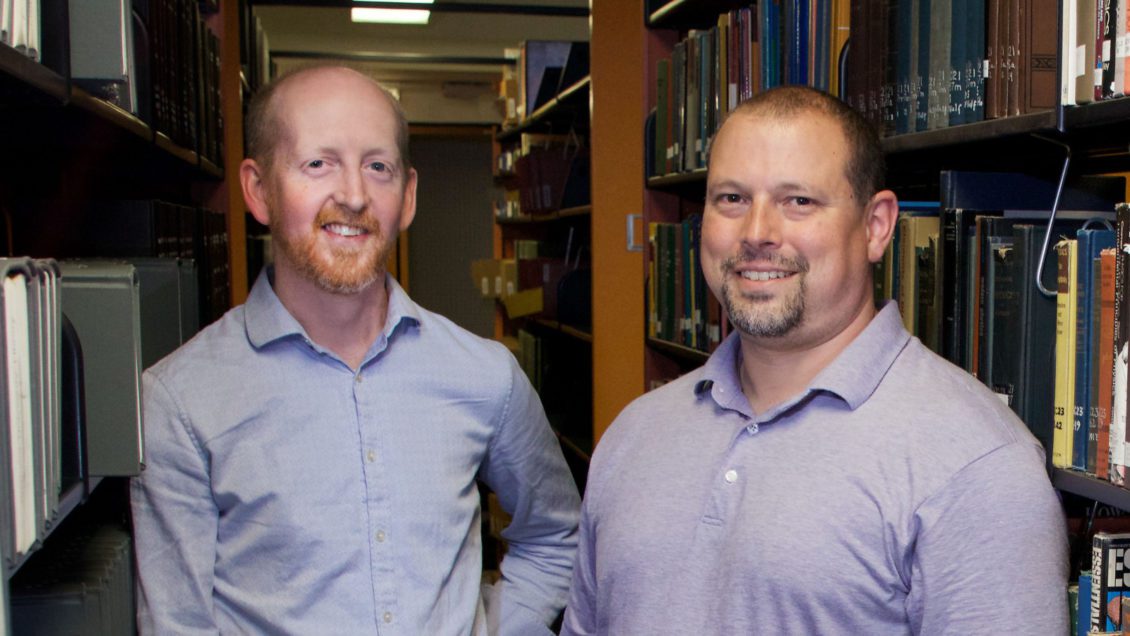CLEMSON — Physics majors in Clemson University’s College of Science can soon be part of an innovative program that is on the leading edge of classroom enrichment and teacher retention in high school physics and K-12 science education.
Professors Sean Brittain and Chad Sosolik have been named to the second cohort of PhysTEC Fellows, a two-year program of The Physics Teacher Education Coalition, whose mission is to improve and promote the education of future physics teachers. The College of Science team is one of five chosen for this cohort to receive support to build and enhance high school physics teacher education programs. The remaining teams are from Bridgewater State University, Colgate University, the University of Texas Rio Grande Valley and the University of Washington Bothell.
“PhysTEC is an organization of the American Physical Society that is aimed at helping physics departments recruit and train physics educators,” said Brittain, chair of the department of physics and astronomy. “We have a huge shortage of qualified physics teachers for high schools. Often, the teachers teaching physics are doing the best they can, but that’s not their area of expertise. What we would really like is for every high school to have a person there who is passionate about teaching physics and spreading that enthusiasm to students.”

Part of Brittain’s mission is to change the perception of physics and let educators know how important its study can be for students.
“Our fundamental belief as physicists is that learning physics and how to think like a physicist has benefits for everybody,” Brittain said. “Unfortunately, there’s sort of a reputation about physics that you have to be a genius or a savant in order to major in physics or that it’s only for people like you see on ‘The Big Bang Theory.’ Our view is that physics is for everybody and it prepares people for a wide range of jobs. Not everybody who majors in physics has to go on to grad school.”
In fact, many will head to the classroom as teachers. Clemson’s PhysTEC fellows aim to help them be better prepared for that career and to help those who are already teaching enhance their content knowledge and find support. A Learning Assistant program will be a big part of that effort. The hope is to begin this fall.
“The Learning Assistant program is to get undergraduate physics majors into the classroom,” Brittain said.
The program will help those undergraduates gain experience and confidence as they facilitate interactive programs in the classroom and work directly with students. It will benefit those serving in large introductory physics classes by providing an extra person to help with instruction.
“The whole point of the program is to increase the output of students who graduate and who are certified to teach physics in South Carolina,” said Sosolik, professor of physics and astronomy. “Who better to do that than the physics department? In order to do that, we have as our goal to look at the structures we have in place, which are jointly administered with the College of Education. We already discussed with them getting the bare essentials in place without making it onerous for students to get that certification.”
The goal is to make it easier and more streamlined for physics majors to become physics teachers, filling a need in South Carolina and across the country.
“Over several years, we have put a flexible degree option into our physics program, which about half of our majors are using right now,” Sosolik said. “It has really freed up for us the ability to be creative in how we offer our elective choices. The plan is to take that flexibility and apply it to a track within our degree which basically rolls in certification for teaching. We want to certify more teachers.”
Brittain said the program will also offer a master teacher-in-residence opportunity for an experienced high school physics teacher who will work with students and give advice on teaching. Research Experiences for Teachers (RET) will bring teachers into the physics department to do research. And as fellows, Brittain and Sosolik will be a part of the 2020 and 2021 PhysTEC conferences and participate in video conferences to exchange ideas and updates with others in their cohort.
Sosolik said it was shocking to stand in front of a class for the first time when he was a graduate student. But this fellowship brings him into an area that has become a passion, even though it wasn’t initially part of his career plan. He came to Clemson as a researcher but worked with Brittain to offer content education for K-12 teachers in Laurens County.
“That’s probably one of the most rewarding things either of us has ever done,” Sosolik said. “We were teaching teachers who didn’t necessarily have exposure to physics.”
Sosolik sees the PhysTEC fellowship as an extension of that approach – one that can have far-reaching benefit.
“It really benefits the state and it benefits our department in turn, if we can actually educate the population and up-and-coming students with proper science training,” he said. “It’s needed for the 21st century workforce. For me to impact 25 or 30 majors every year, which is sort of one of our classes, that’s good. But if I can send one or two of those students out every year back into classrooms where they’re connecting with hundreds and hundreds of students throughout their entire career, at least getting them exposed to physics, I think that’s better for South Carolina.”
Ultimately, the physics majors they inspire to become teachers may inspire their students to major in physics and even come to Clemson University.
“There’s going to be a long fuse to that process,” Sosolik said. “We realize it may take some time to reap extra benefits here, but that’s OK because we’re going to help South Carolina now.”
Get in touch and we will connect you with the author or another expert.
Or email us at news@clemson.edu

